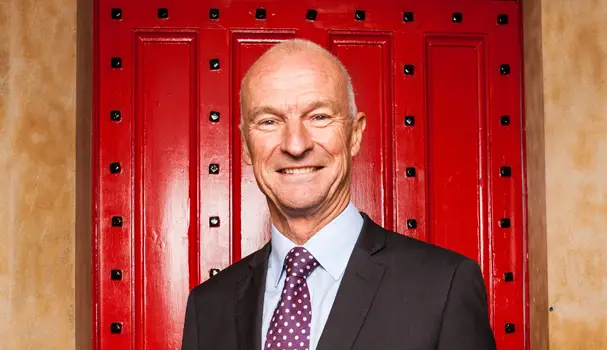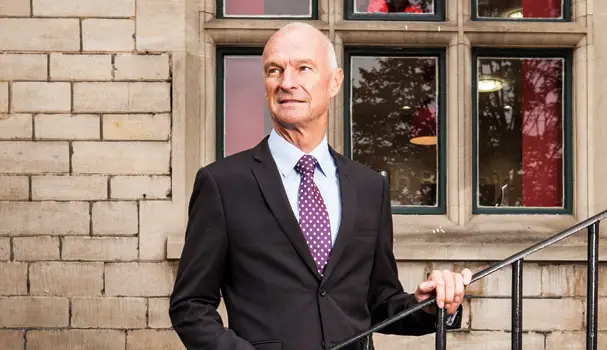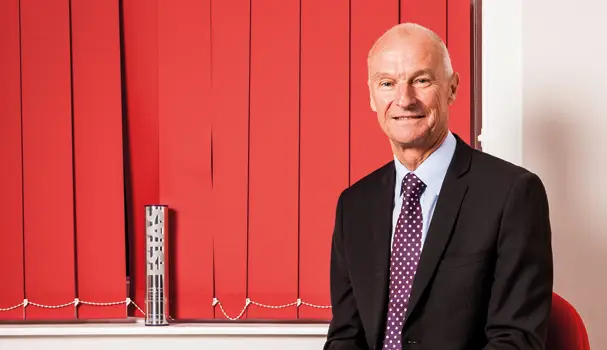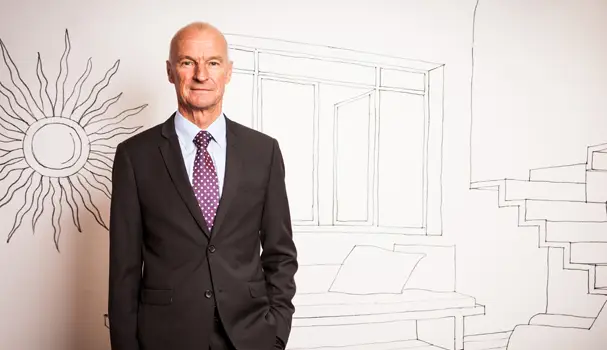Talking to Mike Goddard, the founder, executive chairman and CEO of Belvoir Lettings, you get the sense that he could master anything he turns his mind to. He’s certainly worn many hats in his life, whether they be CEO, RAF wing commander, property developer or world-class triathlete. From building an award-winning lettings business to smashing a world record, Goddard knows what it takes to reach the top. “Drive, enthusiasm, energy, passion, a degree of risk-taking,” he says. “If you bring all of those together, you can succeed at anything.”
Goddard’s story began in West Sussex. He grew up near the coast and attended a traditional grammar school before going on to study chemical engineering at Swansea. But he never put his degree to use: shortly after he graduated he decided to do some voluntary service in Kenya. And a year out eventually became seven: Goddard did briefly return to Britain but only to pick up a post-graduate certificate in education, before heading back to Africa to work with the ministry of overseas development.
It was whilst out in Kenya that Goddard got to exercise one of his greatest passions. “I have always been a runner, right back to running for my university,” he says. “My mountaineering and running exploits were quite extensive.” This is something of an understatement: during his time in Africa he completed ten ascents of Kilimanjaro and 46 ascents of Mount Kenya, respectively the highest and the second highest mountains in Africa. “Probably my biggest claim to fame is breaking the world record for running up Mount Kenya and back,” he says. It took Goddard just four hours and 38 minutes to travel to the summit at 16,500 feet and back again. “I wouldn’t do it these days,” he laughs.
When he finally did return from Africa, Goddard was faced with a decision: he was offered two different positions, one working as a chemistry teacher at Bedford School and the other serving in the Royal Airforce (RAF). “I took the commission in the Royal Airforce because it paid me £200 a year more,” he says. “Money was quite important, even in those days.” Thus began a 17-year career in the education branch of the RAF, during which time he worked his way up from pilot officer – through flying officer, flight lieutenant and squadron leader – to wing commander.
By 1995, Goddard was 45 and beginning to feel that it was time for a change of pace. “I thought there was more to life than working in the Royal Airforce for the next ten years,” he says. Gradually as he’d worked his way up the ranks, his role had become less focused on education and increasingly bogged down in admin, leaving him longing for something more hands-on. So he and his wife Stephanie started to look for a new opportunity. “We wanted to be in control of our own destiny; we thought running a business was the way forward,” Goddard says.
Looking around, Goddard quickly realised there was one industry in dire need of disruption: lettings. “At the time, buy-to-let wasn’t an expression,” he recalls. “Lettings was a bit of a dirty word: it was something you did if you couldn’t afford to buy.” There were few big brands in the lettings space and Goddard was convinced there was room for someone with a different approach.

Originally Goddard didn’t have particularly grand plans for Belvoir. “I had no ambitions to grow a nationwide network of franchises: it wasn’t even on the horizon,” he says. It wasn’t until the business had been running for 12 months that a friend providing resettlement advice for those leaving the military suggested he take a look at the franchising model. “It just suddenly clicked that this was a fantastic way of leveraging my time so I could grow faster than I would have as a corporate,” he says. “It was one of those eureka moments.”
Building a franchise network is easier said than done but this encounter also helped Goddard realise he had an enormous asset at his disposal: a huge pool of ex-military personnel who, like himself, would have been looking for new careers on their return to civilian life. “I made great efforts to speak to the military, to go to their resettlement courses, to advertise in their resettlement magazines,” says Goddard. “I put myself forward as a trustworthy, respectful, ethical, ex-airforce officer.” Before long, Belvoir had a network of 12 ex-military franchisees and was ready to start achieving some serious growth.
Growing its network from there has required Belvoir to give its franchisees a little extra. One of the ways in which it’s been able to attract interest is by providing comprehensive support for those that buy into the franchise. Out of the gate, Belvoir provides its franchisees access to business development managers and a team of auditors to help build their business in the early months. “Gradually, as we wean them off of that, we visit them once or twice a year but we also have a whole host of staff ready to answer their queries,” he says.
Another factor that has been fundamental to Belvoir’s growth has been an ability to set itself apart from the competition. “We have differentiated ourselves with integrity, strong ethics and a very strict adherence to a recognised brand,” Goddard says. Brand is very important to Belvoir but Goddard stresses that it’s not just about logos, trademarked colours or marketing slogans. Just as important has been building a position of trust with customers and establishing a reputation as a specialist in lettings. “We believe in a very high-quality service,” Goddard says. “And we try to instill that throughout our whole network.”
Something else that has undoubtedly given Belvoir a good deal of credibility as a franchise is its founder’s profile within the sector – Goddard is a former chairman of the British Franchise Association (bfa). Having already served a short tenure as the bfa’s director, Goddard was invited by director general Brian Smart to fill the role of chairman in April 2008. “It was very daunting,” says Goddard. “But being an owner-founder, people could relate to me and I could give them the benefit of my experience, having been there myself.” And he evidently proved popular in the position; the bfa bent the rules to keep hold of him. “Normally you only have a two-year tenure and then you have to stop; they asked me to stay on for a third,” he says.
And the bfa isn’t the only body that has sought out Goddard’s expertise; in 2010, he was also invited to join the board of the Property Ombudsman. “At the time, the Property Ombudsman scheme was very orientated toward sales agents and, as lettings was growing, they wanted somebody who had deep lettings experience,” Goddard explains. This made the founder of Belvoir the natural choice to bring an infusion of additional expertise.

But it seems this cut both ways. Not only did the Property Ombudsman benefit from Belvoir’s lettings experience, it seems the franchisor also learnt a few things working shoulder-to-shoulder with sales agents: by September 2013, it had decided to tackle the sales market and announced the launch of an estate agency pilot. In hindsight, Goddard feels Belvoir’s move into sales was perhaps inevitable. “I was famously quoted as saying ‘over my dead body’,” he says. “I should learn, shouldn’t I? Never say never.”
The franchise’s reasoning for expanding into the sales market was twofold: firstly whenever it did customer research, it found consumers were often under the impression that Belvoir already handled both lettings and sales. Secondly, when any Belvoir client wanted to sell a property, the letting agent was forced to refer the business, meaning it often ended up losing a client in the process. “We decided that we were missing a trick,” Goddard says.
This was, in part, the motivation behind the recent acquisition of Newton Fallowell, the east Midlands estate agent, whose 31 sites Belvoir acquired for £3.9m back in July. “I’ve known [founder and chief executive] Mark Newton for many years,” says Goddard. “When he was looking at exiting, he came and asked me whether I might be interested.” Not only has this purchase created a multi-brand strategy that brings additional diversity to Belvoir’s holdings but it also allows both brands to access valuable skills. “Newton Fallowell brings a lot of sales experience; we bring a lot of lettings experience,” he says. “So it’s working very well.”
But Belvoir has taken another step that is likely to have a far more radical impact on its fortunes than acquiring other brands or entering new verticals. Back in 2012, it made the decision to list on AIM, something that can prove to be a controversial move in the franchise sector. “There are people who feel that the interests of the shareholder can be to the detriment of the interests of the franchisee,” Goddard says. “I totally disagree with that.” Instead he feels floating on AIM has had some serious benefits for Belvoir’s franchisees.
As well as driving publicity for Belvoir and giving it a concrete valuation, listing on AIM actually also gave the network some much needed security. If Belvoir hadn’t listed, it would have been impossible for Goddard’s shares to have any liquidity without a full sale. Obviously this made franchisees a little twitchy. “They were worried I might sell out to one of the big boys,” he says. “But I didn’t want to exit and I didn’t want to sell; I just wanted to be able to release some of my shares.” And the IPO also allowed Belvoir to bring in some extra funding, £5m of which it lent to franchisees to grow their businesses. “It was hugely beneficial to the franchise owners,” Goddard says.
You can’t argue with the results: Belvoir had expanded organically to more than 160 sites by the beginning of 2015, with the acquisition of Newton Fallowell pushing it up to 193. And, following its purchase of Goodchilds Estate Agents and Lettings this month, Belvoir’s network now stands at 211. For Goddard, this marks the beginning of a whole new stage of growth. “What’s happening now is a fundamental change,” says Goddard. “We’re arguably becoming the best out there.”

But the nature of Belvoir’s service isn’t the only thing that has shifted over the years. “My role has changed dramatically,” Goddard says. Whilst still acting as both CEO and chairman of Belvoir, Goddard has brought in a wide range of talent to manage the day-to-day running of the business whilst he focuses on more strategic goals. “I joke that they bring out the Zimmer frame once or twice a year,” he says. “Obviously there’s a lot more to it than that.”
One of the benefits of Goddard’s changing role is that it has allowed him the chance to focus on some extracurricular interests. In 2009, he and his wife stumbled across a property up in the Scottish Borders and immediately fell in love. “It was an ex-hotel, 34 bedrooms, very rundown and we’ve taken it on as a project to bring it back to its original standards,” he says. From installing ground source heating to building an artificial lake, the Goddards have returned the Hartree Estates to its former glory and created a new heart to the community. “We recently had a Hartree open day for 300 people, raising money for Macmillan and another local charity,” he says.
And, despite his joke about Zimmer frames, Goddard’s fitness could put most younger businesspeople to shame. For the last five years, he has been making waves as a triathlete, something he got into when he travelled to see his son compete in the World Championship Paratriathlon in Budapest. At a competition after party, someone asked him whether he’d ever considered taking part in a triathlon. “I said ‘I can’t swim and I’ve not ridden a bike since I was a kid’. They said ‘well give it a go’. To cut a long story short: I gave it a go,” he laughs.”
Goddard rapidly became one of the best in the world for his age group, representing Britain on the international stage. “I got a silver medal at the European championships and came fourth in the world championships in New Zealand,” he says. “It just gives me a buzz.”
And evidently old habits die hard: in 2013, Goddard mounted a new expedition up Mount Kilamanjaro, this time with a couple of Olympic athletes in tow. After the London Olympics, he wrote to Alistair and Jonathan Brownlee, who won gold and bronze respectively. “I said ‘you don’t know me but I’m an amateur triathlete and I’d like to take you up Kilamanjaro’,” he recalls. Charmed by his invitation, they agreed: the trio successfully reached the summit and camped in the crater. “We’ve been close friends ever since.””
Clearly there is a dynamism about Goddard that keeps him striving to prosper in new fields. “Most people of my age will have retired by now,” he says. “It’s unusual for someone like me to still be at the helm of a listed company.”
So what’s his secret? “You’ve got to have a strong sense of commitment and a burning desire to be successful,” he says. “If that’s deep down inside you, you will get through the really tough times.””![]()

































